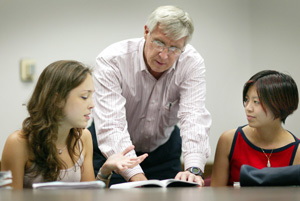 |
|
|||||||||
|
Americans in Paris, and vice versa Allen Sanderson, senior lecturer in Economics and the College, got to the heart of the conflict in his summer course, Contemporary U.S. Economic Problems and Public Policy, when he approached the topic of French wine.
Sanderson asked his French students—on campus this summer as part of an exchange program with the University of Paris—to examine the proposition that a recent drop in French wine sales in the United States was related to American resentment over French reluctance to support the war in Iraq. “We don’t like you,” Sanderson said in reference to an attitude held by some Americans. “And as a result, we don’t buy your wine. But is this a reasonable way to read the figures?” As he did some computations at the board, he explained that other factors, such as an increase in the price of the Euro (with a corresponding rise in French wine costs), a continuing recession-like economy in the United States, and the possibility that wine might be available from other sources could also be behind the sales drop, rather than merely tension between nations. The students listened, took notes, and then paused to eat some sour cream pound cake that Sanderson had brought as a treat. As they passed around the paper plates, Sanderson distributed brochures on Chicago attractions and suggested entertainment for the nearly 20 students gathered in a first-floor Social Sciences Research Building seminar room. Despite some temporary hard feelings brought on by the war, the French students said during a class break, their reception had been warm. “The Americans have been very friendly,” said 20-year-old Olivia Lau, of Paris. Being in Chicago, she said, also helped to expand her English. “I’ve learned quite a bit of vocabulary.” The students appreciated the relatively informal American instruction and the opportunity to learn more about American economics. “Here there is not so much distance between the professor and the students as there is in France,” said Jean-Baptiste Chambon, 20, of Champigny-sur-Marne. In French universities many classes are large lectures, providing little student-faculty interaction. “I also like the fact that we get so many examples of what Mr. Sanderson is talking about,” Chambon added. “In France much of our instruction is more theoretical.” Part of a two-year-old, economics-focused exchange program for University of Paris undergraduates, the students attended the University for the summer, living in the 5700 Stony Island Avenue Residence Hall. During winter quarter the University in turn sends students to the Universite de Paris IX Dauphine (unrelated to other U of C study-abroad programs in Paris). In addition to Sanderson’s class, the French students enrolled in either macroeconomics or microeconomics classes offered through the Graham School of General Studies, said Dan Bertsche, assistant director of the France Chicago Center. They learned about the U.S. economy and, of course, the Chicago School of Economics. The students also took in Chicago’s financial sites, including the Chicago Board of Trade and the Chicago Federal Reserve Bank. Chicago students in Paris, meanwhile, learn about banking, industrial regulation, and the European perspective on economic issues from University of Paris faculty. Both groups of students learn about economics as taught at both institutions, said College Dean John Boyer, but they also learn about another academic tradition, another university, and another major city. “The Chicago faculty has had a long-standing conviction that a knowledge of other cultures is a key component of a true liberal education,” Boyer said. “Exchanges such as that between Chicago and Paris also are long-term investments in trans-Atlantic friendships and international understandings on a personal level.” —William Harms
|
|
Contact
|


